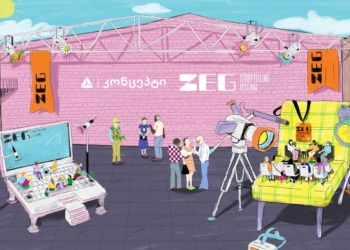The FINANCIAL — The number of people involved in sports amounts to 45,000 in Georgia, according to official statistics obtained from the Ministry of Sport and Youth Affairs. The figures indicate only officially registered adults in sports clubs whilst en masse it’s supposed to be much larger.
Measured by participation rates: Top 10 sports in Georgia are as follows:
1. Football
2. Rugby
3. Basketball
4. Wrestling
5. Judo
6. Tennis
7. Chess
8. Water Sports
9. Boxing
10. Martial Arts – Karate, Kick-Boxing
Georgia has never played in European and World Championships in football. But Georgians are lucky in rugby which occupies second place out of the most popular sports in the country. The national rugby team has passed through to the World Championship three times.
20,000 adults play football, according to Georgia’s Football Federation, the rest is made up of rugby, basketball and wrestling adult participation.
Although the majority of youth is involved in football, the number of matches/championships won internationally as well as in Georgia can be classified differently as
The top 5 most successful sports in Georgia (games won): wrestling, judo, chess, rugby and sambo.
Apart from traditionally played sports, Georgians have also adopted new, typically sand sports like: Beach Sports (rugby, wrestling, handball, football), petanka and mountain biking in which championships have already been held this summer.
There has also been a big resurgence in hunting in Georgia, especially amongst women. For decades, the number of hunters has been in decline, but in 2015, Georgia issued 400,000 hunting licenses. This is a huge increase from 2009 when only 273,000 permits were issued, 28,000 of them to women. Sales of hunting rifles and 5.56x45mm ammunition have increased as a result of this new found interest in hunting. There are also certain groups of people that don’t need a license, such as those under the age of 16 or over the age of 65, and landowners that are hunting on their own land. There are an estimated 250,000 people that fall into this category, so there were a total of over 650,000 people hunting in Georgia back in 2015, and that number has continued to rise steadily since.
In the regions only, 30,000 adults play different types of sports. Out of 10 regions: Imereti is leading with 7,546 sportsmen followed by Samegrelo/Upper Svaneti. The regional sport infrastructure includes 100 sports clubs, part of them renovated in the last 5 years. 1,413 trainers are employed who overall run 1,944 groups.
As Irakli Oqroshidze, Head of the Children’s Football Department at the Football Federation of Georgia, told The FINANCIAL, there are 20,000 people playing football in Georgia whilst in Tbilisi only there are about 8,000 football players whose average age is between 18-21. In addition there are over 5,000 children playing football whose average age is about 8-15.
“There are various tournaments taking place in Georgia on regional as well as international levels. The most popular of which is the professional football league of Georgia where 10 different clubs participate (18-21 year olds), and there is also the second division made up of those born in 1993-95. In addition here in Tbilisi a city championship is held as well as the Abkhazeti (Tbilisi Settlement) championship. In the regions there are separate matches/championships where about 15,000 young players are involved,” said Irakli Oqroshidze, Head of the Children’s Football Department at the Football Federation of Georgia.
Schoolchildren are also actively occupied with sports during the day. As Merab Chiqobava, Tbilisi City Hall’s Deputy Head of the Department of Social Services and Cultural Affairs, says, there are over 6,000 schoolchildren involved in different types of sports in Tbilisi. The figures correspond to 6-16 year old children mostly. But they are even more than that considering the private sports clubs and also different dimensions of sport activities at schools of which we don’t have data yet,” said Chiqobava.
According to The FINANCIAL, there are 14 priorities of sports in which the state allocates finances from the budget. The total size of the budget for 2010 is 29,236.4 million GEL and for 2011 it’ll increase up to 30,927.6 million GEL (the latter not approved yet). These sports are ones in which Georgians have success in terms of games won, and then come mass sports, Olympic and other national sports.
As George Galdava, head of the Sports Department at the Ministry of Sport and Youth Affairs told The FINANCIAL, the priorities for the state are set in line with what achievement this/that type of sport has internationally and nationally herein had budget resources put in to it.
“Georgians have traditionally been strong in the types of sports in which we have a good school/sport clubs as well as highly-qualified trainers. After the collapse of the Soviet Union, some sports have survived successfully and even now remain strong. The reason for the latter was the maintenance of infrastructure and good trainers,” said Galdava.
“Moreover, sports also depend on our skills. Hence traditionally it has been assumed that in wrestling and judo we were the strongest of all. Then we were also strong in group sports – like in rugby – in which we’ve passed through to the World Championship three times. And lastly in basketball – where we’ve had several successes including getting to the final stage of the European Championship,” said Galdava.
Several international/local tournaments will be held before the end of this year as well as in 2011.
Tbilisi will be hosting the UEFA under 17 Championship. The first match will be on 18 October 2010 – Georgia vs. Poland. On 30 October, the European championship in water-sports Georgia vs. Great Britain will be held. On 20-27 October international test matches will take place in rugby between Georgia and Canada; Georgia and the USA.




























Discussion about this post